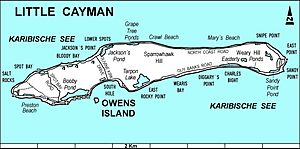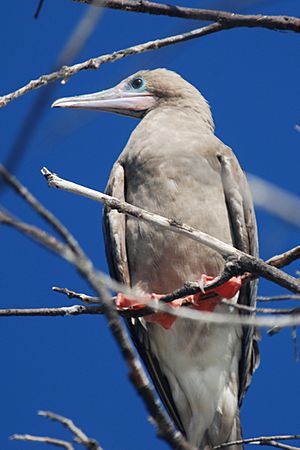Booby Pond Nature Reserve facts for kids
Quick facts for kids
Designations
|
|
| Official name: Booby Pond and Rookery | |
| Designated: | 21 September 1994 |
|---|---|
| Reference #: | 702 |
The Booby Pond Nature Reserve is a special protected area on Little Cayman. This island is one of the Cayman Islands, which is a British territory in the Caribbean Sea. The reserve is a wetland, which means it's a place where the land is often wet, like a swamp or marsh.
About Booby Pond Nature Reserve
This important reserve is located on the south side of Little Cayman. It covers about 43 hectares (that's like 106 acres!). The main part of the reserve is a large, salty pond called a lagoon. This lagoon sometimes floods, especially during certain seasons.
The pond is surrounded by mangrove trees. These are special trees that can grow in salty water. On the northern side of the reserve, there's also a strip of dry forest. This forest has many different kinds of trees and plants, like the gumbo-limbo tree and the beautiful Singapore graveyard flower.
Amazing Birds of the Reserve
The Booby Pond Nature Reserve is super important for birds! BirdLife International has named it an Important Bird Area (IBA). This means it's a key place where many birds live and raise their young.
Some of the amazing birds you can find here include:
- West Indian whistling ducks: About 20 pairs of these ducks live and breed here.
- Magnificent frigatebirds: Up to 200 pairs of these large, dark birds with long wings make their nests here.
- Red-footed boobies: This reserve is home to a huge number of red-footed boobies, sometimes as many as 20,000! They are known for their bright red feet.
- White-crowned pigeons: These pigeons have a distinctive white cap on their heads.
- Caribbean elaenias: A small, active bird found in the Caribbean.
- Vitelline warblers: A colorful warbler that also calls this reserve home.
Because of its importance for birds and other wildlife, a big part of the Booby Pond Nature Reserve is also recognized as a wetland of international importance under the Ramsar Convention. This is an international agreement that helps protect important wetlands around the world.



